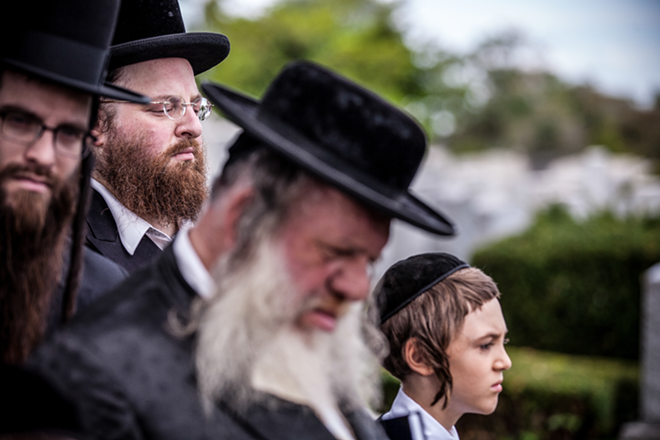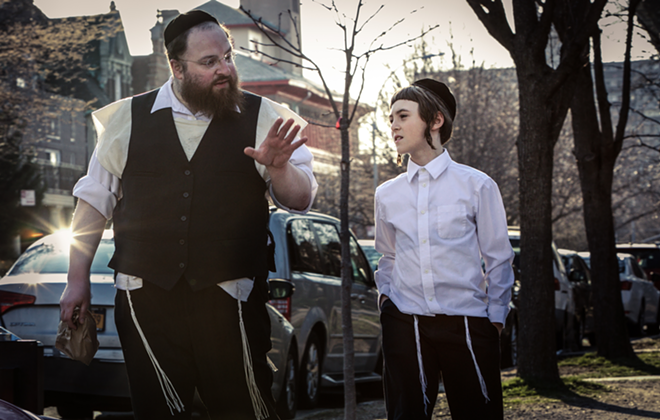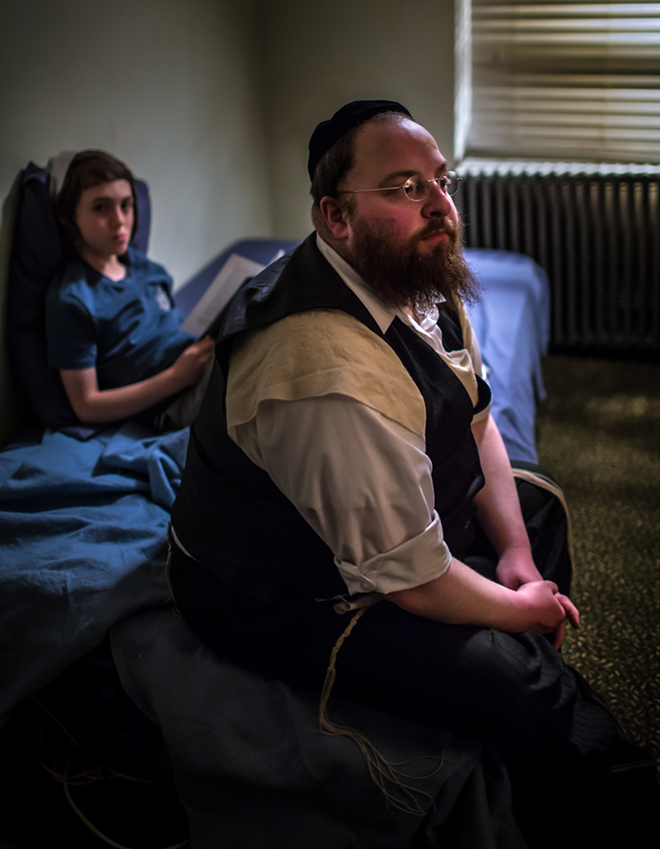Whatever language you speak — Hindi, Mandarin, Swahili, Tagalog, English — your eyes and hands convey as much as your tongue. In the case of the Yiddish language film Menashe, set in the inward-looking Hasidic community of Borough Park, Brooklyn, thank goodness for eyes and hands.
The Hasidim can come across as a blinkered, hidebound sect — actually the liberal movement of Orthodox Judaism from a few hundred years ago in Eastern Europe, now part of the worldwide Jewish diaspora — who refuse to accept modernity and its discontents. Liturgy, appearance, language and family are all tightly controlled and pre-determined. Individual identity is subsumed by the group. The Other becomes the Only.
The men wear long black garb, with hats and beards, and both boys and men grow and groom side curls. The women have no part of their body exposed except their face and their hands. Married women wear a wig so their hair is not revealed. Education is mostly religious with the day spent learning Torah (also the first five books of The Bible) and Talmud (centuries of accumulated rabbinic discussion and debate). Attending college is discouraged as men are to grow up to be Torah scholars and rabbis, and women are to be housewives and mothers.
Though Yiddish, English and Spanish — and broken versions of all three — are spoken in Menasche; there are no subtitles. Nor are they necessary. The faces, the eyes, the hands, the bodies speak a common language — all too understandable no matter your first language — of anger, despair, hope, love, defiance, resignation and triumph. Nor has the director, Joshua Z. Weinstein, bothered to footnote the often inexplicable rituals of this faith, much of it nonintuitive to the uninitiated. There's little exposition as he simply depicts it as is, both its mysteries and its myopias.
This is the story of a well-meaning but hapless grocery clerk, Menashe (Menashe Lustig), trying to find his way after the death of his wife Lea. The Hasidim require that all children are raised with two parents, so his pre-teen son Rieven (Ruben Nyborski, the only non-Hasidic actor in the film) must be given up until Menashe acquires another wife. Thus Rieven is to be adopted by the boy’s strict, married uncle Eizik (Yoel Weisshaus), as dictated by centuries of tradition and Talmudic interpretation and as required by the Rabbi Rul (Meyer Schwartz). It is written that all children must be raised jointly by a mother and a father, end of discussion. But the widower is given a brief reprieve to spend one last week with his son prior to Lea’s memorial. This week, as you can imagine, is fraught with anxiety, tenderness, turmoil and desperation as Menashe tries to prove to the skeptical community — and they are all watching and doubting and judging — that he can be a capable parent.

It’s a delicate, unassuming film about a slice of human drama from a notoriously private community. What could be off-putting about the sect's esoteric insularity is, in fact, a remarkable testament to the life-affirming bond between father and son. In the midst of a closed, absolutist culture threatened by any hint of unorthodoxy, the man and boy try to find their own way.
It is bittersweet, funny, engaging, and occasionally infuriating. As is life, no matter your tribe.
The particular has become universal. We are invited in and we see ourselves. We are, if not Spartacus, at least Menashe.
The film has the appearance of a documentary — an anthropological and ethnological study of this self-contained sect and its harsh and unbending rules. Not surprising, considering that Weinstein is most noted for his documentary work. But this is his first feature film, and it was shot somewhat undercover within the Hasidic community depicted in the film, and one of the only movies to be performed in Yiddish in nearly 70 years. As Weinstein was still considering just what sort of film to make set in this community of hundreds of thousands of adherents, he had a casting call and only 60 showed up to share their stories. One was Menashe Lustig who revealed that he was a widower and that he had lost custody of his young son who lived only three blocks away. The emotional truth of this revelation becomes the basis of this narrative film that also has the neorealist qualities, almost cinema verite, of the documentary.
Casting was done from within the Hasidic community and Weinstein chose non-professional, Yiddish-speaking actors from among people who had never seen a film, much less acted in one! Meyer Schwartz, who plays the Rabbi, is a taxi driver in real life. Menashe Lustig, of course, plays himself. Weinstein had the actors rehearse the scenes in English before shooting in Yiddish. Yet all these actors convey a deeply textured and nuanced understanding of the character they are playing.
For sure, there’s a reason Menashe is labeled, in Yiddish, as a schlimazel (unlucky) and a schlemiel (inept). And he’s a schlub (unkempt) to boot. No matter, the Talmud says that for a man to be happy, he needs three things: a nice wife, a nice home, and nice dishes. Go figure. Menashe has none of these but seems happy enough just as he is. Still, he’s a father who adores his son and loves his community and his God, so he must find a way to make it work if he’s to become a mensch (a person of integrity and honor). It won't be easy.
One of the most painful pieces of Menashe's life that we have to endure with him is an apparently set-up match-making session (find me a find, catch me a catch) with a prospective new mate where she pounces on infantilized men: "I know why Hasidic men are so helpless. Your mothers spoil you. Then your wives take over." And like many self-destructive schlubs and schlemiels, whose behavior overrides his intentions, he oversleeps, gives his son chocolate cake and soda pop for breakfast, and fails to get him to school on time. In order to find more time to spend with his son, he rushes at work and manages to ruin an entire shipment of gefilte fish. He manages to screw up the bachelor-proof kugel pudding for the memorial, surely the nadir of Hasidic despair. Can it get any worse? Well, at a gathering of men and boys ostensibly studying the Talmud, there's too much L'Chaim, so much so that the boy has to call his uncle to come rescue him from a woozy, slightly drunk father. Things do not look good.
The Talmud tells us is that all beginnings are hard.
But we pull for this put-upon father in his efforts to please both God and man, and most importantly, find himself and provide for his son. It's a touching and endearing, though occasionally bumbling and fumbling, bond between them as this man-child and child try to move forward.
For Menashe, his life ahead — whatever it brings and however he achieves it — is a new beginning.
And it will be hard.



